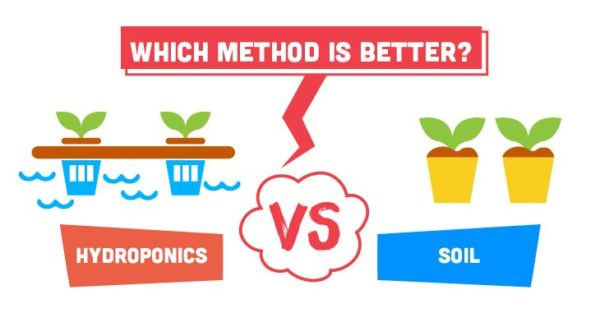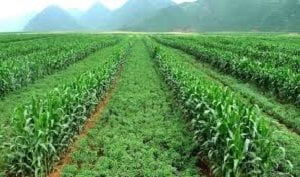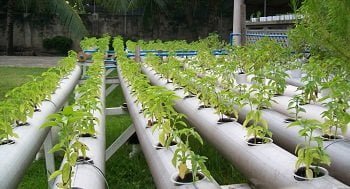Hydroponics vs Soil: Which Method is Better?

Hydroponics is consistently growing in popularity over the traditional use of soil in growing crops. There are many benefits of feeding plants using nutrient-rich water, as is the standard practice in hydroponics.
Many farmers and researchers have reported amazing benefits from using hydroponics, but is it really better than farming on soil?
Following is a side by side comparison of these 2 farming methods. By taking a closer look, you'll gain a deeper understanding of the 2 practices, and be in a better position to choose the right method for your needs.
1. Soil Farming

For as long as anyone can remember, farming of crops has typically involved the tilling and watering of soil. Some soil types are more nutrient-rich than the rest, while others have better pH levels which support plant growth.
Soil usually refers to a mix of sand, clay, silt, water, decomposing organic matter, air, and minerals from rocks. Their percentages vary from soil to soil and this makes soil testing a necessity in both gardening and commercial farming.
The best soil type should have a pH level of around 6. A good soil should also have a good mix of sand and clay, making it neither a sandy nor a clayey soil. This soil type is called loam.
Read More: 10 Best Soil Test Kits
Potting soils or mixes are also used in soil farming, although most potting mixes contain practically zero natural soil. These growing media contain components that make them fluffy, better aerated, and moist for longer periods, to improve crop yield.
Pros
- Soil is abundant everywhere. Soil is very abundant in its natural form, making it the ideal medium to farm crops. It is also the natural growth medium for most plant species since most plants in our world grow on soil. You can plant a seed into the soil anytime and anywhere you want. It's that easy.
- Soil farming industry is well developed. In addition to the abundance of soil, the farming industry built around it is very developed. There are machines for all kinds of farming routines and other products to help with nearly every aspect of soil gardening. This makes it easy for most people to engage in soil farming.
- It's less labor intensive. Gardening with soil does need a certain amount of work, but when compared to hydroponics, soil-based farming appears less labor intensive.
- Cheaper startup cost. Also unlike hydroponics, soil-based farming is cheaper to set up initially, because you don't need any fancy equipment to grow crops in the soil.
- It's easy to do. Planting crops in soil is easy and unless you are carrying out some sort of experiment, planting in soil is as natural as anything can get. In fact, it's so easy that kids do it.
Cons
- Slower plant growth. Soil-based growth media produces slower growing crops than water-based media. This is simply a result of easier access of plant roots to water-borne nutrients in a hydroponic system. In a soil-based system, the roots have to do more work for fewer nutrients.
- Brings more pests and diseases. Soil gardening suffers from more pests and diseases than hydroponic gardening. This comes from the different microbes that are usually present in the soil.
- Requires more water. Soil farming depends on available water to produce high yielding crops. Although many irrigation systems have gotten developed over the years which are very water efficient, hydroponics remains more water efficient than soil farming.
2. Hydroponic Farming

Hydroponic farming or gardening is a method of growing plants without soil. The nutrients needed by the plant are dissolved and transported in water, making it easy for the plant to feed itself and grow.
The plant's roots are usually supported by any suitable material which allows the easy growth and movement of the roots while being totally immersed in a nutrient solution.
Hydroponics is gaining popularity worldwide because of the many benefits that it offers the farmer or gardener. It makes crops grow faster, and this means more profits for a farmer because he can farm more times during the season.
Due to the easy access to nutrients in the water-based solution, the crops usually produce more yield than do crops that are soil farmed.
There's also a lot of future potential for hydroponic farming because of its efficient use of space, and its integration with other farming systems, such as using waste water from fish farms as its nutrient source.
Pros
- Faster plant growth. One amazing fact about hydroponic agriculture is that it speeds up the growth rate of crops, especially leafy greens. You can cut, for example, the harvest time of a head of lettuce from 2 months to just one month using hydroponics. This also means that you can replant many more times within the season.
- Brings more yields. In addition to faster growth rates, you also get more yields per crop, meaning more money for those who sell their produce.
- No weeding necessary. Weeds only grow on soil. When you are using a hydroponic system, there are simply no weeds and no need for weeding. This lack of weeds is another reason while crops do so well with this system.
- Fewer pests and diseases. Microbes, pests, and diseases come mostly from the soil. A hydroponic environment uses no soil, so the presence of these pests and disease-causing organisms are greatly reduced.
- Much more water efficient. Hydroponic systems can use up to 90% less water than soil-based farming systems. This makes hydroponics very interesting for mass farming in certain regions of the world.
- More space efficient. Plant roots usually spread out in their search for nutrients. With hydroponics, they don't need to spread out because they already get enough nutrients easily. This creates space savings, which can mean a lot in commercial farming.
Cons
- Higher capital cost. For some people, the major barrier to hydroponic farming or gardening is the cost of setting up equipment. There are different offers for hydroponics systems, with some being quite affordable, but hydroponic agriculture needs more upfront cost than soil-based agriculture.
- Needs specialized skill. Hydroponics is not as simple as soil farming, which gets done by even young kids. You'll need to learn the basics first and work with that knowledge in hydroponics.
- It's more work. You'll need to put in more work with a hydroponic system, but it also produces more output. So, the extra work could well be worth it.
Making the Right Choice
Hydroponics is rapidly changing the face of gardening and commercial farming across the globe. In order to choose between traditional soil farming and hydroponics, you'll need to consider exactly what you need and which system can best offer it.
Following is once again, an overview of both systems' features.
Soil | Hydroponics | |
|---|---|---|
Produce yield | Low to average | High yields |
Growth speed | Average | Fast |
Use of water | Poor | 90% less than soil-based farming |
Use of space | Average to poor | Very efficient |
Absorption of nutrients | Average | Very efficient |
Startup cost | Cheap | Costly |
Labor | Less intensive than hydroponics | Intensive |
Conclusion
The many benefits of hydroponic agriculture continue to grow its popularity, although soil-based agriculture also has its own benefits.
If you don't mind getting down on your knees and getting dirty, then soil gardening could be for you. If you are the type that loves a challenge and to try out something new and innovative, then please give hydroponics a try.
Read More:
- Hydroponics vs. Aeroponics: Which Method Is Better For You?
- Hydroponics vs. Aquaponics: Which Should You Use?
Last Updated on December 25, 2018 by Tom Bradly
